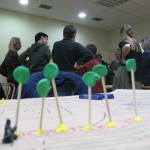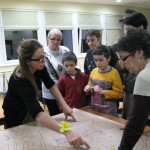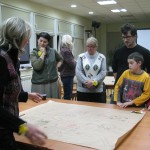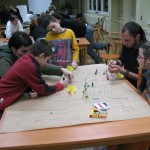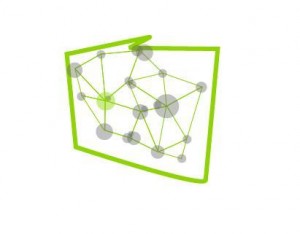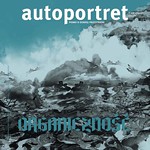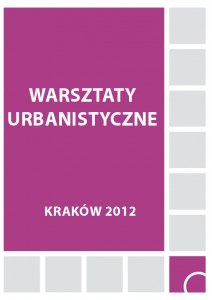
Z przyjemnością informujemy, że w dniach 15-18 maja odbędzie się trzecia edycja warsztatów urbanistycznych Kreatywna Przestrzeń Publiczna, organizowanych przez Koło Naukowe Polityki Regionalnej studentów Gospodarki Przestrzennej Uniwersytetu Ekonomicznego w Krakowie pod patronatem „Autoportretu”.
Celem warsztatów jest teoretyczne i praktyczne przygotowanie uczestników do procesu aranżowania przestrzeni publicznych.
W tegorocznej edycji weźmie udział
80 studentów kierunków urbanistycznych
z całej Polski, których zadaniem będzie opracowanie rozwiązań dla terenu miasteczka studenckiego Akademii Górniczo-Hutniczej.
Część inauguracyjna warsztatów, otwarta dla publiczności, rozpocznie się w najbliższy wtorek (15 maja) o godz. 10.00. Przedpołudniowe wykłady poprowadzą m.in. Agnieszka Wójcik (Przestrzeń publiczna), Paweł Kubicki (Miejskie przestrzenie kreatywne. Spojrzenie socjologiczne), Anna Komorowska (Zielony street art, ogrodnicza partyzantka i ogrody tymczasowe. Alternatywne rozwiązania we współczesnej architekturze krajobrazu) oraz Piotr Kaczmarek (GIS w przestrzeni publicznej).
Do współpracy zaproszono także ASP oraz biuro architektoniczne Ingarden & Ewy (Małopolski Ogród Sztuk).
Czas warsztatów: 15-18.05.2012
Czas wykładów: wtorek, 15.05.2012, godz. 10.30-13.30
Miejsce wykładów: Uniwersytet Ekonomiczny w Krakowie, ul. Rakowicka 16, Pawilon Sportowy, sala nr 9.
(Na podstawie materiałów nadesłanych przez organizatorów)
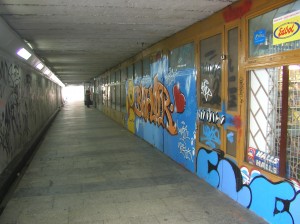 Wystartował serwis krakow.naprawmyto.pl, przy pomocy którego mieszkańcy miasta Krakowa mogą zgłaszać wszelkie problemy i usterki, jakie zauważą w swoim najbliższym otoczeniu.
Wystartował serwis krakow.naprawmyto.pl, przy pomocy którego mieszkańcy miasta Krakowa mogą zgłaszać wszelkie problemy i usterki, jakie zauważą w swoim najbliższym otoczeniu.
Zgłoszenia mogą dotyczyć takich obszarów jak infrastruktura (np. dziury w drogach, niedziałające światła), czystość publiczna (np. nieuprzątnięte śmieci), bezpieczeństwo (np. brak pasów na niebezpiecznych przejściach, doświetlanie niebezpiecznych miejsc), czy źle działające usługi publiczne (np. wywóz śmieci, niesprzątnięte wały przeciwpowodziowe). Można to zrobić w prosty sposób, poprzez stronę internetową lub aplikację na urządzenia mobilne – do ściągnięcia ze strony krakow.naprawmyto.pl Każde zgłoszenie jest rejestrowane w systemie, a odpowiedni komunikat przekazywany do instytucji publicznych odpowiedzialnych za daną kwestię.
Projekt ma charakter pilotażowy, bierze w nim udział 11 wybranych miast i 1 powiat. W Krakowie realizowany jest przez Fundację Plan C wraz z partnerami – stowarzyszeniem Pracownia Obywatelska oraz Federacją Związków Gmin i Powiatów RP. Inicjatorem i fundatorem budowy serwisu jest Fundacja im. Stefana Batorego. Za koordynację prac nad powstaniem serwisu odpowiada Pracownia Badań i Innowacji Społecznych „Stocznia”.
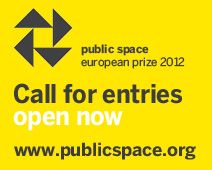
Poniżej przedstawiamy informacje dotyczące naboru zgłoszeń do kolejnej edycji nagrody European Prize for Urban Public Space 2012.
***
WHY PUBLIC SPACE?
With ideas of equality, plurality and progress constituting part of its very foundations, the European city is today facing new challenges arising from its exponential growth and increasing social and cultural complexity. Some of society’s main problems are radically expressed in the city’s public spaces. Segregation, rampant construction, homogenisation and privatisation of urban space are some of the phenomena that are putting into jeopardy the ideal of the open, plural and democratic community that has always been so distinctive of the European city.
The European Prize for Urban Public Space is a biennial competition that aims to recognise and encourage the creation, recovery and improvement of public space in the understanding that the state of public space is a clear indicator of the civic and collective health of our cities.
CALL FOR ENTRIES
The sponsoring institutions of the Seventh European Prize for Urban Public Space are the following:
– Barcelona: Centre de Cultura Contemporània de Barcelona (Centre of Contemporary Culture of Barcelona – CCCB)
– Frankfurt: Deutsches Architekturmuseum (DAM)
– Helsinki: Museum of Finnish Architecture (MFA)
– London: The Architecture Foundation (AF)
– Paris: La Cité de l’Architecture et du Patrimoine
– Rotterdam: Nederlands Architectuurinstituut (NAI)
– Vienna: Architekturzentrum Wien (Az W)
The Prize, which is honorific by nature, is awarded jointly to the authors and promoters of the projects chosen by the Jury. The prize-winners (of the Prize itself and Honourable Mentions) will receive a Diploma confirming the award. In addition, the winner of the Prize will receive a commemorative plaque which is to be installed in the prize-winning public space.
The prize-winning works, the finalists and a selection made by the Jury will be published in the European Archive of Urban Public Space, which brings together and makes available to the public the best projects that have been presented in the competition since its inception.
INTERNATIONAL JURY
The Jury of the 2012 Prize will consist of the following members:
President: Josep Llinàs, who will be representing the Centre of Contemporary Culture of Barcelona
Jury members:
Ole Bouman, director of the Nederlands Architectuurinstituut (NAI)
Sarah Ichioka, director of The Architecture Foundation (AF)
Juulia Kauste, director of the Museum of Finnish Architecture (MFA)
Francis Rambert, director of La Cité de l’Architecture et du Patrimoine
Peter Schmal, director of the Deutsches Architekturmuseum
Dietmar Steiner, director of the Architekturzentrum Wien (Az W)
Secretary: David Bravo i Bordas, representing the Centre of Contemporary Culture of Barcelona
The Jury will take into consideration only those interventions that comply with the conditions of participation and it is empowered to declare the competition null and void. Secretariat functions will be performed by the Centre of Contemporary Culture of Barcelona, which will designate the secretary who is to assist the jury and produce the minutes of the sessions during the selection process of the Prize winners.
SCHEDULE
– 17 October 2011 – opening of the campaign of calling for entries for the Prize
– 17 October 2011 – 19 January 2012 – period of registration
– 5 March – 11 April 2012 – first part of the Jury’s deliberations (on-line)
– 19 and 20 April 2012 – Jury’s working sessions at the CCCB
– 29 June 2012 – prize-giving ceremony
CONDITIONS OF PARTICIPATION
Works that have created, recovered or improved public space within the geographic limits of the Council of Europe in the years 2010 and 2011 may present for the Prize. These entries must be presented by the authors or the institutions that have sponsored the public space project.
Given that some urban public space interventions are of very long duration, any project that has not been completely finalised in the time period of 2010-2011 may still present for the Prize if enough phases of the envisaged end result have been completed to enable evaluation of the eventual repercussions of the intervention as a whole within its urban setting.
Anyone wishing to present for the Prize must complete and submit, within the established time limit, all the documentation stipulated in the Rules.
SELECTION CRITERIA
The criteria that will govern selection of the prize-winning projects from among those that are presented for the European Prize for Urban Public Space will not only be related with the quality of the work from a strictly architectural point of view since the jury will also consider other aspects in its evaluation of the effects of the urban transformation that has taken place in the specific setting and its impact on collective life:
– The explicitly urban nature of the intervention. The size of the city or town is not a limiting factor although priority will be given to medium-sized or large municipalities and those with a more general urban significance.
– The public ownership and/or clearly public-spirited vocation of the project.
– Appropriateness of interventions to the functions required of public space, from those directly linked with citizens’ occupation of a space, through to those pertaining to the collective imaginary.
– Capacity of the interventions to reduce social fractures within the city and eliminate physical and/or symbolic barriers in order to enhance quality of life for the inhabitants.
– Contribution of the projects in the domain of environmental improvement, in promoting public transport and innovation in the treatment of public installations, energy resources and urban waste.
– The degree of citizen participation and engagement in the conception, production and/or subsequent maintenance of the space. Degree of acceptance of the project by users.
– Transversal character of the planning concepts and/or objectives that have guided the project (sociology, demography, history, architecture, economy, engineering, landscaping, anthropology).
DOCUMENTATION REQUIRED
The documentation required from anyone who wishes to present for the Prize is:
– 3 rigid panels in DIN A3 format with graphic and textual information about the work.
– A description of the work, approximately 4,500 characters in length, written in English and including an account of the previous state of the site, the aim of the intervention, a description of the intervention, and a final assessment of the project.
– A minimum of 10 photographs and plans of the work.
ENTRY PROCEDURE
The entry procedure for the Prize, which is free of charge, consists of two parts:
On-line registration
To begin your registration click on the REGISTRATION button on the upper left part of this page.
The participant must register on-line by filling in, first, the basic form regarding the project and contact person and, then, providing all the other necessary information (technical file for the project, 3 panels, descriptive account, information concerning author/s, promoter/s, and photographs), besides uploading the photos and plans of the work.
The person entering for the Prize can continue to modify and complete the registration file as often as s/he wishes until the registration period closes. On-line registration automatically closes on 19 January 2012.
If the person entering for the Prize is presenting more than one work, the on-line registration procedure must be followed for each work separately.
Detailed instructions regarding on-line registration may be found at
http://www.publicspace.org/files/GUIDELINES.pdf
Presentation of the physical material at the CCCB
The following documentation must be submitted to the CCCB:
. One printed and signed copy of the Rights Sheet (this may be found in the procedure for on-line registration) once the data have been duly provided.
. 3 numbered panels: these must be rigid (in foam board or similar material) in DIN A3 format and oblong orientation. They must contain the following information:
– Map (or photomap) showing the location of the work inside its urban context (to scale).
– A pair of photographs of the site before and after the intervention, preferably from the same vantage point.
– Photographs of the finished work, indicating the two that are considered to be most representative. Images showing citizen use of the new space will be positively valued.
– Textual explanations in English where deemed necessary.
The documentation must be submitted in a well protected packet through the post, delivered by messenger or in person at the CCCB before 23 January at 2 p.m. In the case of packages sent by post or messenger, the date of dispatch must be certified at the post office or by the messenger service, and the CCCB is to be notified of the dispatch of the package at publicspace@publicspace.org on the same day. The package should be sent to the CCCB general registry (open on non-holidays from Monday to Friday, from 9 a.m. to 2 p.m.), at the following address:
PUBLICSPACE 2012 / registration code
Registre General
Centre de Cultura Contemporània de Barcelona
Montalegre, 5
E-08001 Barcelona
Espanya
The documents submitted for the Prize will not be returned to the participants, who will not receive any fees for rights of public communication or use of the material selected, and who will also bear the costs of any claim or outlay pertaining to rights of intellectual property that might arise from the reproduction or use by the organisers of the projects that are presented. Entering for the Prize requires conformity with all the conditions specified in these rules.
INFORMATION
INFORMATION, CONTACT AND RECEPTION OF DOCUMENTATION
Centre de Cultura Contemporània de Barcelona
Montalegre, 5
E-08001 Barcelona
Tel.: +34.93.306.41.00
www.publicspace.org
publicspace@publicspace.org
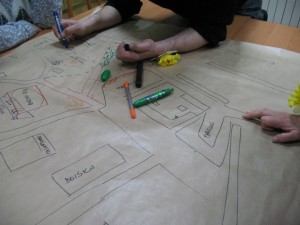 Mieszkańcy krakowskiego osiedla Pisaki Nowe spotkali się 9 lutego w osiedlowym Klubie Kultury „Piaskownica” aby wspólnie pomyśleć o funkcjach i kształcie terenu zielonego wewnątrz osiedla. Spotkanie rozpoczęła cześć edukacyjna: architekci krajobrazu opowiadali o tym, jak różnorodna może być zielona przestrzeń publiczna. Następnie uczestnicy spotkania sami zmierzyli się z planowaniem uwzględniając różne potrzeby mieszkańców: place zabaw dla dzieci, miejsca do uprawiania sportu, cichego relaksu a nawet grillowania. Dzięki architektom, wolontarystycznie wspierającym pracę mieszkańców, powstały spójne i ciekawe pomysły. Szkoda, że tym obywatelskim planowaniem nie były zainteresowane władze spółdzielni mieszkaniowej.
Mieszkańcy krakowskiego osiedla Pisaki Nowe spotkali się 9 lutego w osiedlowym Klubie Kultury „Piaskownica” aby wspólnie pomyśleć o funkcjach i kształcie terenu zielonego wewnątrz osiedla. Spotkanie rozpoczęła cześć edukacyjna: architekci krajobrazu opowiadali o tym, jak różnorodna może być zielona przestrzeń publiczna. Następnie uczestnicy spotkania sami zmierzyli się z planowaniem uwzględniając różne potrzeby mieszkańców: place zabaw dla dzieci, miejsca do uprawiania sportu, cichego relaksu a nawet grillowania. Dzięki architektom, wolontarystycznie wspierającym pracę mieszkańców, powstały spójne i ciekawe pomysły. Szkoda, że tym obywatelskim planowaniem nie były zainteresowane władze spółdzielni mieszkaniowej.

